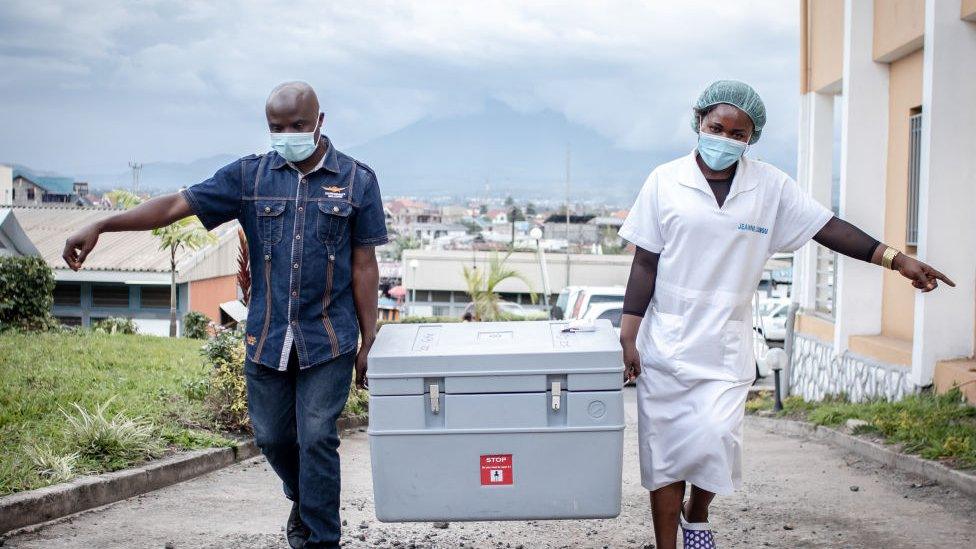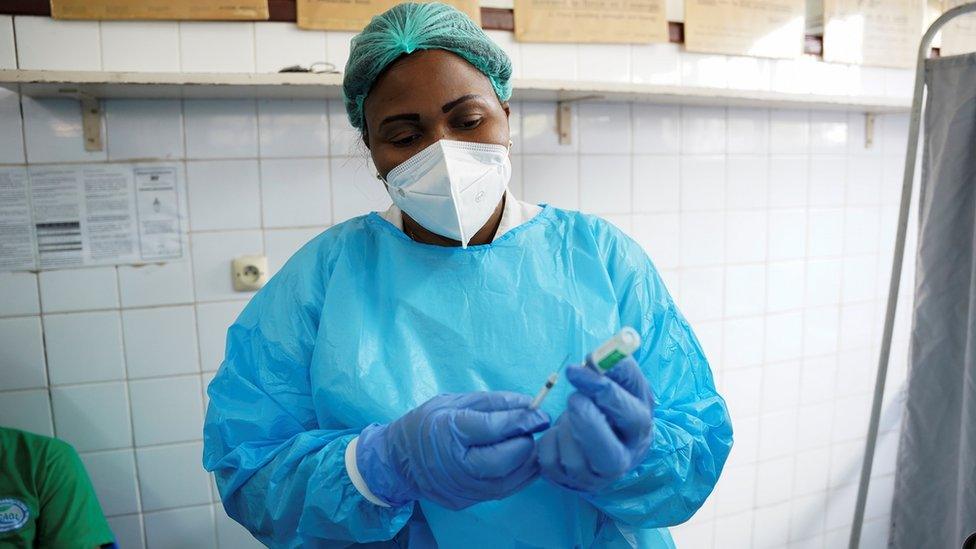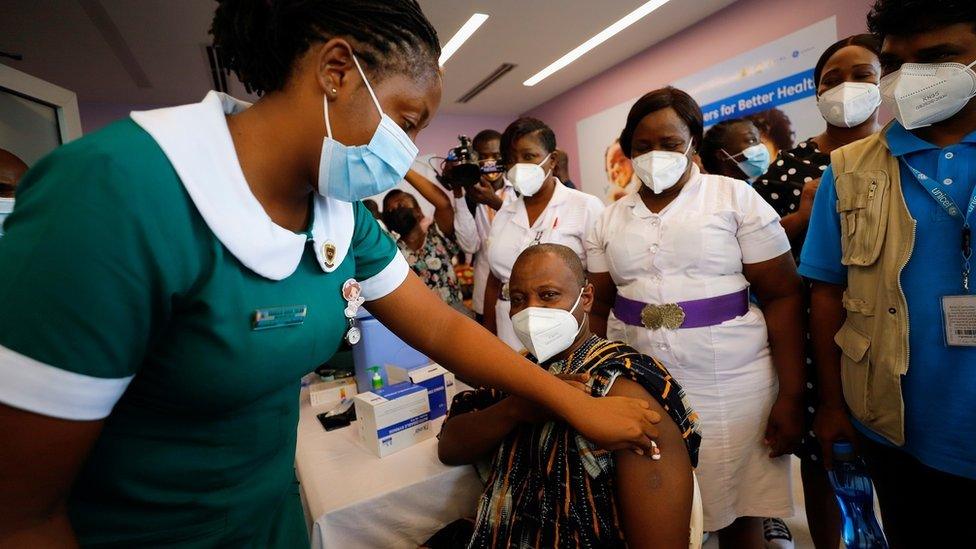Covid-19 vaccines: Why some African states can't use their vaccines
- Published

Health officials have struggled to deliver vaccines across DR Congo
Many thousands of vaccine doses have been destroyed in African countries because they've exceeded their expiry dates.
Others are being returned by countries saying they will be unable to use them before they expire.
The UN's children's fund, Unicef, is urging those countries intending to donate vaccines to release them early enough so that they can be used in time.
Which countries have had problems using their vaccines?
Malawi destroyed almost 20,000 doses of the AstraZeneca (AZ) vaccine, while South Sudan announced it would destroy 59,000 doses.
Both countries had received these vaccines from the African Union, but had not been able to administer them by their expiry date of 13 April.
"While discarding vaccines is deeply regrettable in the context of any immunisation programme, WHO [World Heath Organization] recommends that these expired doses should be...safely disposed [of],, external"
The Democratic Republic of Congo, meanwhile, said it could not use most of the 1.7 million AZ doses it received under the global Covax scheme for poorer countries.
These have an expiry date of 24 June and have been sent to other countries including Ghana and Madagascar.
Covax vaccine plan: What is it and how will it work?
South Sudan is also handing back 72,000 doses it got through the Covax scheme.
It had received 132,000 doses of the AZ vaccine in March, with an expiry date of the end of June.
Of these, South Sudan has been able to administer just 10,000, but has kept a further 50,000 to distribute before they expire.
Why have these vaccines not been used?
The AstraZeneca vaccine can be stored safely in refrigerated conditions for up to six months.
But when given vaccines with a short shelf life before expiry, countries have struggled to administer them.
South Africa had received one million doses from India in February with an expiry date of 13 April.
But the the government decided not to use them, concerned the vaccine offered insufficient protection from the variant prevalent in the country.
So in late March, these doses were passed on to other African countries through the African Union but with very little time left to use them.
South Sudan was one of the recipients, but said they had not been made aware of the expiry date.
Nigeria was another, but it also said it would be unable to use all its doses, so some of these were reassigned to neighbouring Togo and Ghana.
The WHO says only Togo and The Gambia have confirmed they used all these doses by the expiry date.
It's similar story with the Covax scheme, with some countries unable to use their vaccines in time.
Why can't African countries distribute vaccines faster?
Many countries failed to prepare adequately before receiving the vaccines, Phionah Atuhebwe, from the WHO in Africa, says.
"That is one of the reasons we are seeing the slow pace of rollout," she says.
South Sudan says in addition to the problem of limited financial resources, the country has also struggled because of a reluctance by health care workers to get vaccinated.
A health ministry official there has also pointed out that its parliament was slow in approving the vaccines, along with delays in training health workers for the task.
"The continent as a whole knows how to vaccinate and has been vaccinating for other diseases," says John Nkengasong, head of the Africa Centres for Disease Control (CDC), "but the key is how do you scale that up - and... at speed?"

For DR Congo the problem is not only weak health services but also a very poor transport network - making the delivery of vaccines to remote areas a major issue.
To complicate matters further, the country suspended its AstraZeneca vaccine rollout in mid-March, amid safety concerns, resuming on 19 April - more than a month later.
Is vaccine hesitancy a problem in African countries?
Some experts and politicians blame concerns over the safety and efficacy of vaccines in general for the slow uptake in many countries in Africa - but it is hard to quantify that impact.
"It took a while to convince people," Sierra Leone Health Minister Austin Demby tells BBC News
"So it is not just vaccine hesitancy, it is like [having] vaccine sceptics to start with."

Ghana is one of the few countries in Africa to have fully utilised its vaccine supplies
Malawi virologist Gama Bandawe says mistrust of vaccines has played a role in the country being unable to use all the supplies it has received.
And South Africa's decision to stop using the AstraZeneca vaccine, amid concerns around cases of blood clots, may have added to these doubts.
"The government did the best they could - but perhaps the general public has not been as receptive as was expected," he says.
A study commissioned by the Africa CDC on Covid-19 vaccine perceptions in 15 countries indicated a significant proportion of people had concerns around vaccine safety, external.
On average, about 20% of respondents said they would not have a vaccine - but the proportion varied from below 10% in Ethiopia, Niger and Tunisia to 41% in DR Congo.

GLOBAL SPREAD: Tracking the coronavirus pandemic
TRACKER: Coronavirus cases in Africa

